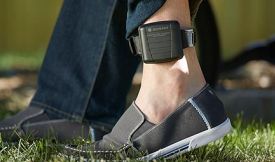
As DUI defense practitioners are well aware, a transdermal monitoring device such as a “SCRAM” device (a Secure Continuous Remote Alcohol Monitoring Device) is a prevalent but sometimes onerous tool in the bond condition, plea bargaining and sentencing processes. A client may be ordered to wear a SCRAM device ankle bracelet prior to trial, during probation, or as part of a compromised resolution of the case. The transdermal monitoring device continuously monitors a person’s blood alcohol level through skin contact and perspiration in order to verify the defendant hasn’t consumed any alcohol.
There are certainly drawbacks to these devices, however. They are expensive, and often uncomfortable. These bulky ankle bracelets may cause skin irritation, cannot be fully submerged in water, and are very obviously visible unless artfully concealed.
Engineers at the University of California San Diego, however, are coming to the rescue! They are developing an unobtrusive alternative option for continuous alcohol monitoring. Combining nanoengineering and electrical engineering, the professors leading this work have created a temporary tattoo that electrochemically detects the alcohol level in a person’s sweat—sweat that is induced by the tattoo itself.[1] A tiny, flexible electronic circuit board is attached to the tattoo through a magnetic connector. It is this circuit board that powers the tattoo and communicates the blood alcohol levels wirelessly to a mobile device.
A device like this could even be used voluntarily or recreationally. Few people intentionally get behind the wheel when they are unsafe to drive; many have just misjudged the amount of alcohol they consumed and its influence on them. The creators of this temporary tattoo point out that a transdermal device such as this would be a simple, safe way to monitor your own alcohol consumption. Because it can communicate wirelessly via Bluetooth with a cell phone, it is conceivable that you could even set your phone to alert you when your blood alcohol level reaches a certain level. Although you can currently buy a personal breath test device to monitor your own alcohol level (or even one that works in conjunction with your smart phone!), breath test devices (especially inexpensive ones for personal use) are notoriously inaccurate, and they require a 20 minutes break from eating or drinking anything—including water—before they can provide an accurate result. With an unobtrusive, ongoing monitoring device like this temporary tattoo and tiny circuit board, one could discretely be mindful of their intoxication at a social event without any disruptions.
[1] University of California – San Diego. “Flexible wearable electronic skin patch offers new way to monitor alcohol levels.” ScienceDaily, Aug. 2, 2016. <www.sciencedaily.com/releases/2016/08 /160802151324.htm>.
About the Author: Steven Oberman has been licensed in Tennessee since 1980, and successfully defended over 2,500 DUI defendants. Among the many honors bestowed upon him, Steve served as Dean of the National College for DUI Defense, Inc. (NCDD) and currently serves as chair of the National Association of Criminal Defense Lawyers DUI Committee. Steve was the first lawyer in Tennessee to be Board Certified as a DUI Defense Specialist by the NCDD.
He is the author of DUI: The Crime & Consequences in Tennessee, updated annually since 1991 (Thomson-West), and co-author with Lawrence Taylor of the national treatise, Drunk Driving Defense, 8th edition (Wolters Kluwer/Aspen). Steve has served as an adjunct professor at the University of Tennessee Law School since 1993 and has received a number of prestigious awards for his faculty contributions. He is a popular international speaker, having spoken at legal seminars in 30 states, the District of Columbia and three foreign countries.
If you would like to contact the author, please visit: http://www.tndui.com